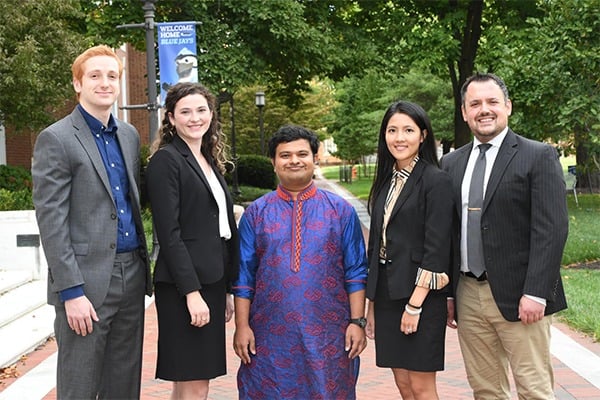Three Johns Hopkins doctoral students studying biomedical engineering have been named Siebel Scholars for 2023, an honor that reflects their exceptional academic performance and outstanding demonstrated leadership.
Since its founding in 2000, the Siebel Scholarship has been awarded to 70 Johns Hopkins graduate students. This year’s recipients are among 83 honorees from top universities. They join a formidable network of more than 1,700 researchers, scholars, and entrepreneurs. Recipients receive a $35,000 award to support their final year of studies.
The 2023 Siebel Scholars from Hopkins BME are:
Savannah Est-Witte
As a PhD candidate in the Department of Biomedical Engineering, Savannah Est-Witte is developing next-generation polymeric particles for protein and mRNA drug delivery, with particular focus on designing more effective immunotherapies for cancer. Her research has been highly collaborative, resulting in nine coauthored manuscripts and 14 presentations across multiple institutions and disciplines. She has received several awards for her work including the National Science Foundation Graduate Research Fellowship and the ARCS/MWC Scholarship.
Outside the lab, Est-Witte is an enthusiastic learner and educator, having completed over 18 credit hours of additional coursework in public health as well as developed and instructed her own course for undergraduates. She is passionate about leadership, equity, and service, and has mentored 11 graduate and undergraduate students. She has played a leading role in the JHU BME PHD Equity, Diversity, and Inclusion committee, and is active in multiple organizations dedicated to supporting individuals from underrepresented backgrounds in science.
Justin Lowenthal
Justin Lowenthal began the MD-PhD program at Johns Hopkins after graduating summa cum laude from Yale in 2011, where he was awarded the Alpheus Henry Snow Prize, the top honor awarded to an undergraduate. After completing a prestigious Fellowship in Bioethics at the National Institutes of Health Clinical Center and his first two years of medical training, he embarked on collaborative PhD research in the Johns Hopkins laboratories of Sharon Gerecht and Leslie Tung. His work focused on probing the effects of oxygen on early cardiac development and on modeling the genetic heart disease arrhythmogenic cardiomyopathy, combining stem cell differentiation, three-dimensional platforms, and developmental biology techniques. He has co-authored seven book chapters, 10 scientific manuscripts, and 10 manuscripts in bioethics and health policy; has presented at more than 20 meetings; served as an inaugural JCI scholar; and received the AHA Predoctoral Fellowship in 2019.
Lowenthal has demonstrated leadership and commitment to community at every level. He works on health policy, care affordability, health equity, and social justice through national leadership roles with multiple organizations, including the advocacy organization Doctors for America, and has provided testimony in front of the Baltimore City Council, the Maryland legislature, and U.S. congressional committees. He has been a leader among medical and MD-PhD students by co-chairing multiple student groups, coordinating initiatives such as Partnering Toward Discovery, and spearheading the development of policies to improve the medical and graduate student experience, including a committee to address medical student mistreatment. He has also served the local community, particularly during the COVID-19 pandemic, and he has mentored numerous students within the laboratory as well as in medical school.
Melody Shao
Melody Shao works under Biomedical Engineering Professor Rachel Karchin. Her thesis focuses on creating computational methods for immuno-oncology, and on identifying biomarkers for cancer therapeutics. She has authored eight peer-reviewed publications and a patent. Additionally, she has been selected to present in multiple conferences—of particular note, she won a Trainee Award for the 2022 Cancer Genomic Consortium Annual Meeting.
Shao’s belief in bringing bench solutions to bedside inspire both her research and extracurricular endeavors. Her AI-based computational method is currently being licensed by Genetech, Inc., and she won second place in the 2019 JHGCC case competition by developing a plan for bringing a medical device to market. In BME, Shao served as the Vice-President of BME PhD Council and as a Professional Development Chair for BME EDGE.
Read about all the 2023 Siebel Scholars from Johns Hopkins on the Hub.

